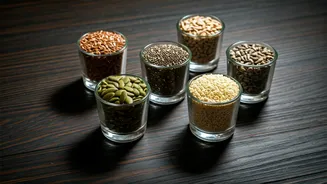Seeds: Nature's Boosters
Seeds, often overlooked, are nutritional powerhouses capable of providing significant health benefits, especially for cardiovascular well-being. Focusing
on a variety of seeds can introduce a range of essential nutrients, including fiber, healthy fats, and antioxidants. Fiber contributes to the reduction of LDL (bad) cholesterol levels by binding to it in the digestive tract, aiding in its excretion. Healthy fats, like those found in certain seeds, help in lowering triglycerides and improving overall cholesterol profiles, contributing to a reduced risk of heart disease. Antioxidants present in seeds combat oxidative stress, which can damage blood vessels and contribute to the development of heart problems. Incorporating seeds into the diet is a simple yet effective strategy to promote heart health, offering a natural approach to disease prevention and overall wellness. The selection and consumption of seeds is therefore a valuable step towards a heart-healthy lifestyle. The best thing is you can easily add them to your daily diet, making them a sustainable and beneficial addition to your health regimen.
Flaxseeds: Omega Powerhouse
Flaxseeds are renowned for their high content of omega-3 fatty acids, crucial for heart health. These fatty acids help reduce inflammation, lower blood pressure, and decrease the risk of blood clots. Flaxseeds also contain lignans, which act as antioxidants and may help in lowering cholesterol levels. To get the maximum benefits from flaxseeds, it's recommended to consume them ground, as this allows for better absorption of their nutrients. You can incorporate ground flaxseeds into your diet by adding them to smoothies, oatmeal, yogurt, or baked goods. Aim to consume about 1 to 2 tablespoons of ground flaxseeds daily to reap their health benefits. However, it's crucial to note that while flaxseeds are beneficial, they should not be considered a substitute for medical treatment. If you are on blood-thinning medications, consult your doctor before significantly increasing your flaxseed intake, as it may affect their efficacy. With a regular intake of flaxseeds, you can experience a significant improvement in your cardiovascular health.
Chia Seeds: Fiber Rich
Chia seeds are excellent sources of soluble fiber, which plays a vital role in reducing LDL cholesterol levels. This fiber binds with cholesterol in the digestive system, preventing its absorption and aiding in its elimination from the body. Chia seeds also contain omega-3 fatty acids, antioxidants, and minerals like calcium, which support overall heart health. The high fiber content in chia seeds can also contribute to improved blood sugar control, which is beneficial for heart health as well. A simple way to incorporate chia seeds is to soak them in water or milk to form a gel-like consistency, then add them to various dishes. Adding 1-2 tablespoons of chia seeds to your daily diet can provide a good dose of fiber and other essential nutrients. Like flaxseeds, chia seeds can be added to your diet through smoothies, oatmeal, and yogurt or even used in baking. Their versatility makes them an easy and convenient addition to any meal plan. The continuous consumption of chia seeds can result in significant improvements in heart health by helping manage cholesterol levels and promoting overall cardiovascular function.
Hemp Seeds: Complete Protein
Hemp seeds are a complete protein source, containing all nine essential amino acids necessary for the body's repair and maintenance. They are also rich in healthy fats, including omega-3 and omega-6 fatty acids, which contribute to heart health by reducing inflammation and improving cholesterol profiles. Hemp seeds offer a favorable ratio of omega-6 to omega-3 fatty acids, which supports cardiovascular well-being. In addition, these seeds are a good source of fiber, aiding in the reduction of cholesterol levels. The presence of minerals like magnesium and potassium helps regulate blood pressure. You can easily incorporate hemp seeds into your diet by sprinkling them on salads, adding them to smoothies, or using them in homemade granola. Consuming 2 to 3 tablespoons of hemp seeds per day can provide significant benefits to heart health. Given their complete nutritional profile and versatility, hemp seeds represent a valuable addition to your dietary choices, offering a holistic approach to promoting heart health and overall wellness.
Pumpkin Seeds: Nutrient Boost
Pumpkin seeds are an excellent source of magnesium, which is crucial for regulating blood pressure. High blood pressure is a major risk factor for heart disease. Furthermore, pumpkin seeds contain antioxidants and healthy fats, supporting cardiovascular health by reducing inflammation and improving cholesterol levels. The fiber content in pumpkin seeds also contributes to lowering cholesterol, further enhancing their benefits. These seeds are incredibly versatile and can be added to the diet in several ways, such as snacking on them roasted, adding them to salads, or incorporating them into trail mixes. A handful of pumpkin seeds per day, roughly 1 ounce, can provide a significant boost in magnesium and other nutrients. They are a delicious and easy way to enhance your diet with essential nutrients that support heart health and overall well-being. Pumpkin seeds offer a tasty and efficient way to boost your heart health naturally.
Sunflower Seeds: Vitamin E Source
Sunflower seeds are rich in vitamin E, a potent antioxidant that protects cells from damage caused by free radicals. This protective effect is beneficial for cardiovascular health, as it helps prevent the oxidation of LDL cholesterol, a major factor in the development of heart disease. These seeds also contain healthy fats and phytosterols, which can help in lowering cholesterol levels. Additionally, sunflower seeds provide magnesium and other minerals that support heart function and regulate blood pressure. They are easy to incorporate into your diet; a simple way to enjoy them is by snacking on a handful of sunflower seeds. These seeds can also be added to salads, cereals, or baked goods. Consuming about a quarter cup of sunflower seeds daily provides a significant dose of vitamin E and other nutrients. This makes sunflower seeds a simple yet powerful addition to your daily diet for supporting cardiovascular health. Including these seeds in your diet will help boost your antioxidant intake and contribute to overall well-being.



















